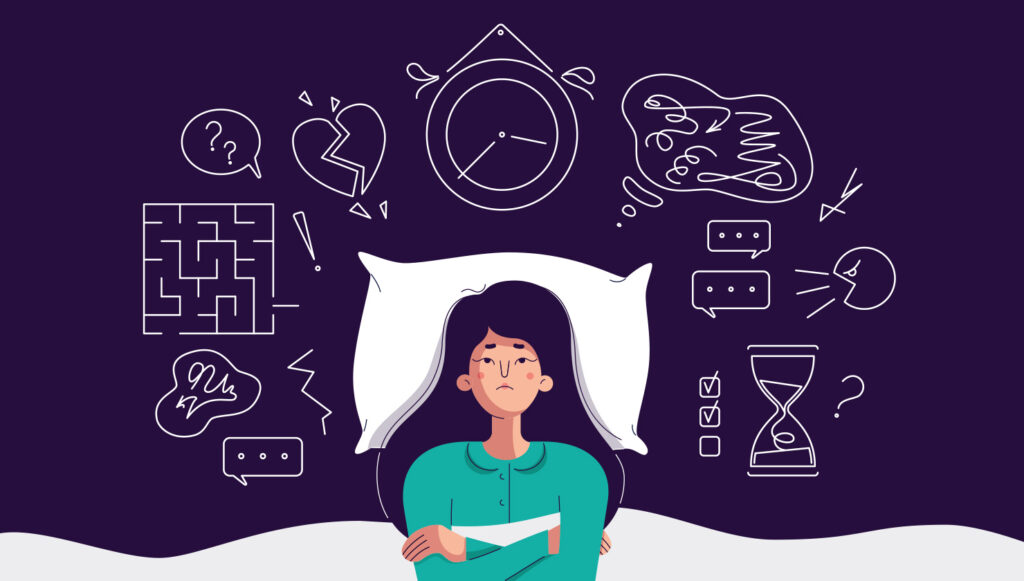
Do you have a sleep problem? Do you find it hard to doze off in the evening? Do you catch yourself laying in bed and staring at the ceiling while others sleep soundly? Let’s get to the bottom of your sleeplessness problem with our insomnia quiz free of charge!
If you can’t sleep, use this time productively by reading about what insomnia is, how it affects you, and how to get you back on track for restful nights. Later, you can take our insomnia quiz.
What is insomnia?
Insomnia is an all-too-common sleep problem. It occurs when a person struggles with either falling or staying asleep. Insomnia might result in daytime fatigue, decreased energy levels, work performance, and overall negative quality of life.
Short-term insomnia (also called acute insomnia) can last for several days. Stressful events can cause this type of sleep condition. Insomnia turns into a long-term issue when it lasts for at least three months, and you can observe sleep disturbances three times a week at minimum.
How should I know if I suffer from insomnia?
What are the most prevalent symptoms of of insomnia? Let’s look at the list below to see if any of these sound familiar. You should have at least one of these types of sleep problems:
- struggling with falling asleep at night
- waking up randomly at night
- overnight waking
- feeling tired after a night’s sleep
- resisting to go to sleep when it’s bedtime (applies to children)
- difficulty sleeping without help from a parent (applies to children)
- being tired and fatigued during the day
- irritability
- problems with concentration
- increased accidents or mistakes
- worry about sleep
- behavioral issues, like hyperactivity or aggressiveness
Is it possible you suffer from sleep apnea? Answer a few questions and self-evaluate.
Symptoms of chronic insomnia must occur a minimum of three times each week for at least three months. Short-term insomnia symptoms can occur less frequently and last less than three months.
What kind of insomnia could I have?
Primary insomnia and secondary insomnia used to be identified as different types of insomnia by the American Academy of Sleep Medicine. Primary insomnia was thought to arise on its own and wasn’t connected to any other health condition or problem. Secondary insomnia was supposed to be the result of a health condition or substance use.
The AASM changed the diagnostic classifications to better reflect the findings of related research and clinical methodology.
What can be the reason for insomnia?
What can suddenly cause insomnia? There is no single cause for this sleep disorder, but there are factors that put a person at greater risk of experiencing insomnia. These include:
- stressful circumstances like death of a family member, divorce, changing jobs
- sensory triggers like noise, light, or temperature
- history of being a light sleeper
- your sleep schedule changing
- certain medication
- caffeine, tobacco, or alcohol use
- having family members with insomnia (insomnia tends to run in families)
- anxiety disorder, depression, or other mental health problems
- sleep apnea or restless legs syndrome
- pregnancy
- dementia
- ADHD
- PMS and menopause
- being older
It’s worth pointing out that not everybody with one or more of these risk variables has insomnia. If you suspect you have insomnia, you should get an official diagnosis.
Insomnia diagnosis and treatment options for insomnia
What does insomnia diagnosis look like? Are there blood tests for insomnia? A healthcare professional will do an examination and inquire about your medical and sleep history. They may suggest that you log your sleep issues for a couple of weeks. They may discuss how much and how well you sleep with your bed partner. A sleep center may also conduct additional tests, like a sleep disorder test.
What are the treatment options for insomnia? Numerous remedies are available. In the case of short-term insomnia, a doctor can give out information about this disorder and what steps to take to decrease symptoms.
Cognitive behavioral therapy
Professionals believe that cognitive behavioral therapy is the best first-line treatment for long-term insomnia. It can help you handle your worries about insomnia better, as well as improve your sleeping habits.
Medication
In some cases, medication might be the recommended option. Medication may encourage sleep, decrease stress about sleep issues, and improve daytime performance.
Here are some tips to prevent insomnia:
- avoid taking naps
- eliminate alcohol, caffeine, and tobacco
- try not to eat too late
- limit screentime before bed
- have a consistent sleep schedule
- keep your bedroom dark and quiet
Do I have insomnia? Quiz yourself with this simple test we prepared for you. See if you display symptoms of a sleep disorder with this free online insomnia test! Good luck and sweet dreams.
What are the 3 types of insomnia?
There is acute, transient, and chronic insomnia. These are the three types.
What options can you get?
You have insomnia, You most likely have insomnia, You probably don’t have insomnia, You don’t have insomnia
Is there a teenage insomnia quiz?
Insomnia in adolescents is a common issue. There are many tests specific for children and teenagers that you can find online.

